Master the art of kitchen Feng Shui to boost health and wealth; discover the ancient rules that could transform your cooking space.
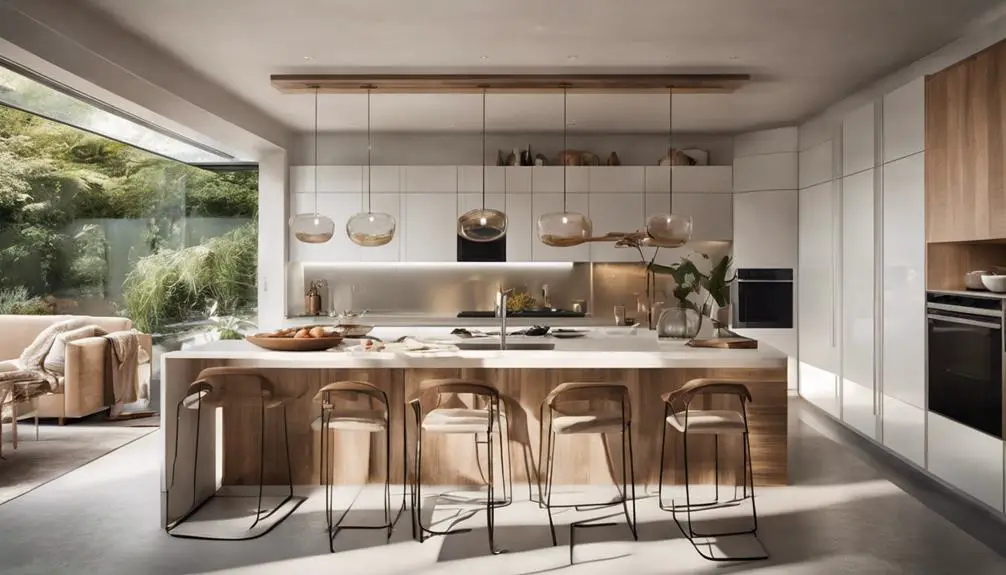
Kitchen Feng Shui Rules
While you might think arranging your kitchen is just about finding the perfect spot for your coffee maker, it's actually a delicate art form known as Feng Shui. This ancient Chinese practice involves harmonizing your surroundings to enhance your life.
Specifically, in the kitchen, it's believed to improve health and wealth. Now, you're probably wondering, 'how exactly does placing my stove in the southeast corner lead to prosperity?' Well, to unravel the mysteries behind these Feng Shui rules, let's dissect the underlying principles.
With this knowledge, you might just stir up some positive energy in your own kitchen.
Key Takeaways
- Kitchen positioning in Feng Shui promotes harmony and unity, with spatial arrangement and color balance being crucial factors.
- Stove placement in auspicious sectors and avoiding negative placements enhances energy flow and harmony in the kitchen.
- Sink's placement, material, and well-designed drainage system are key in preventing energy clash with the stove.
- Refrigerator positioning and decor influence prosperity energy, with energy-efficient models and balancing the five elements being essential for harmony.
Understanding Kitchen Feng Shui
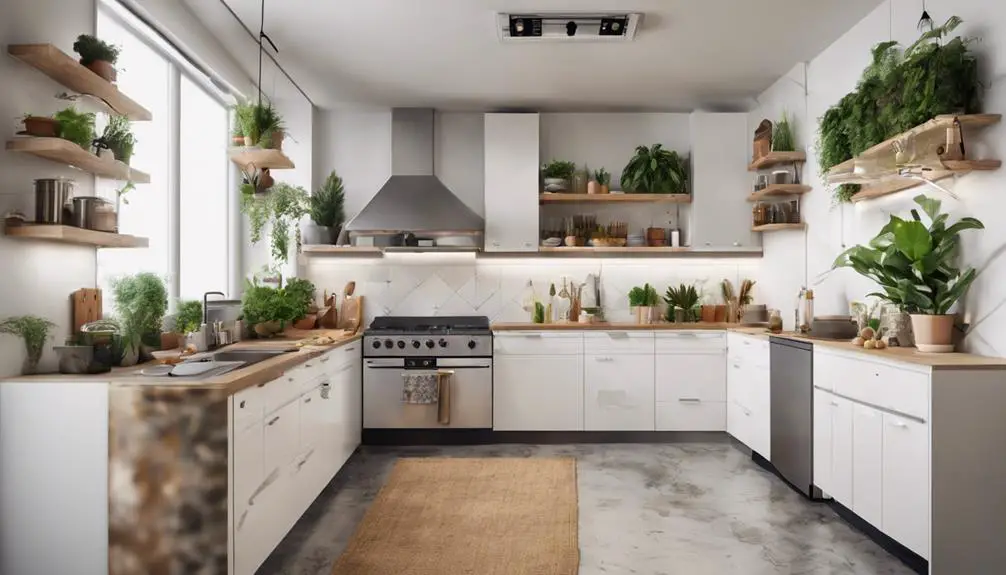
Diving into the realm of kitchen Feng Shui, you'll discover it's not just about aesthetic appeal, but also about creating a harmonious, positive energy flow within your cooking space. Understanding the Energy Flow Principles is paramount. It's about how the energy, or 'chi', moves in your kitchen. The 'chi' should flow smoothly, but not too fast, allowing positive vibes to linger, enriching your cooking and dining experience.
You'll find the concept of the five elements – Wood, Fire, Earth, Metal, and Water – fascinating. Each element is associated with a specific color and direction. Wood stands for growth and creativity, represented by green and east direction. Fire symbolizes passion and transformation, with red representing it and south being its direction. Earth signifies stability, with yellow as its color and center as its focus. Metal denotes clarity and preciseness, with white and west being its symbols. Lastly, Water, representing wisdom and serenity, is symbolized by blue or black and north direction.
Understanding the Color Significance in Feng Shui, you'll be inspired to choose colors that resonate with your kitchen's orientation and purpose, ensuring a balanced, energetic, and harmonious atmosphere.
The Importance of Kitchen Positioning
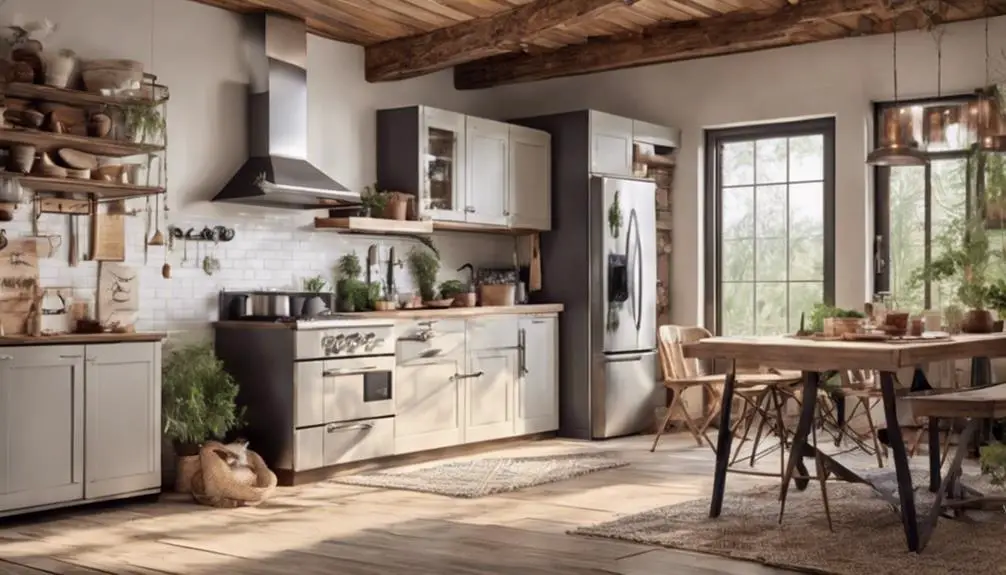
While understanding the color significance and energy flow principles is crucial, it's equally important to consider your kitchen's position, a key aspect often overlooked in maintaining a balanced and harmonious environment. The placement of your kitchen within your home can influence the energy within the space, affecting both your cooking and dining experiences.
Drawing from traditional Feng Shui principles, a kitchen positioned in the center of the home can create a sense of harmony and unity, fostering positive energy flow. The central position allows the color influence and lighting effects to be evenly distributed throughout the space, creating a balanced, soothing atmosphere.
However, positioning isn't just about the kitchen's location within your home. It also pertains to the arrangement of furniture and appliances. The spatial arrangement should allow for a smooth, unobstructed flow of energy, promoting ease of movement and efficiency.
In essence, the positioning of your kitchen is a delicate dance of balance and energy flow. It's about finding the perfect spot that enhances the color influence and optimizes lighting effects, ultimately creating a harmonious, inviting space that nurtures both your culinary endeavors and your overall well-being.
Optimal Stove Placement Rules
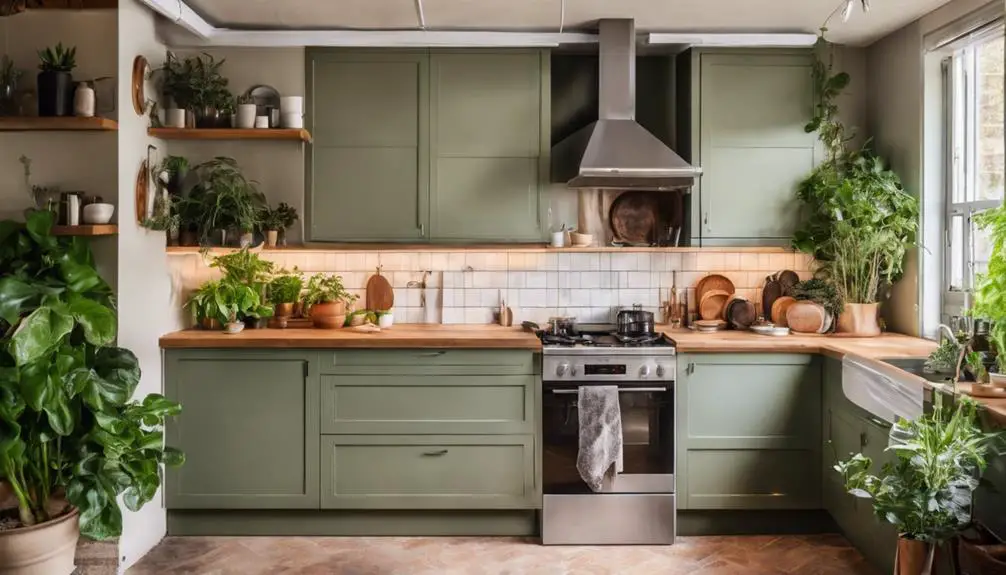
In the realm of kitchen Feng Shui, the placement of your stove isn't just a matter of convenience—it's a fundamental element that can greatly influence the energy flow and harmony within your cooking space.
The most auspicious spot for your stove is in the south or southeast sector, symbolizing the fire element. However, don't position it directly opposite the sink or fridge—this can create a clash of opposing elements. Additionally, your stove shouldn't be placed under a window or directly in line with the front door, as it can lead to the loss of positive energy.
Understanding the Stove Color Significance is equally crucial. Each color influences the energy in unique ways. For instance, red stoves can enhance the fire element, while white ones could balance it.
Here's a simple table to guide you:
| Stove Position | Effect | Solution |
|---|---|---|
| South | Enhances Fire Element | Optimal |
| Opposite Sink/Fridge | Clash of Elements | Re-position Stove |
| Under Window/Front Door | Loss of Positive Energy | Re-position Stove |
| Red Color | Overpowering Fire Element | Balance with Other Elements |
| White Color | Balanced Fire Element | Optimal |
Mastering the art of Fire Element Management can harness the best energy for your kitchen.
Feng Shui Guidelines for Sink
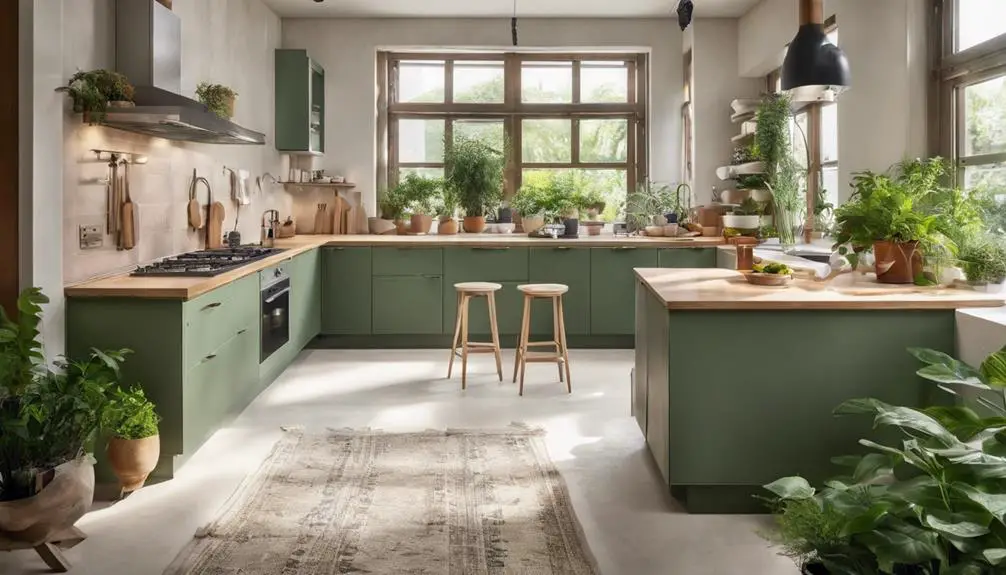
Just as with your stove, the positioning of your sink carries significant importance in kitchen Feng Shui, setting the stage for a harmonious flow of energy. Ideally, it shouldn't directly face the stove or be positioned back-to-back with it. This is to prevent a clash between the water and fire elements, which could disrupt the energy flow.
Sink Material Choices are crucial too. Opt for materials that foster positive energy, like stainless steel or porcelain. They symbolize the flow and purity of water, enhancing the Feng Shui of your kitchen. Avoid materials like plastic, which aren't as durable or energy-efficient.
Lastly, pay attention to Drainage System Design. A well-designed system ensures smooth water flow, a symbol of wealth and abundance. Ensure it's free from obstruction, signifying a clear path for favourable opportunities.
Refrigerator Positioning for Prosperity

Similar to your stove and sink, the location of your refrigerator can also greatly influence the prosperity energy in your kitchen, setting the tone for a balanced and positive environment. The position of your fridge, its decor, and the model you choose can all play a significant role in harnessing the right kind of energy.
Consider the following fridge decor tips and positioning rules for attaining prosperity in your kitchen:
| Position | Description |
|---|---|
| Away from the stove | Fire and water elements should not clash, hence the fridge should be placed away from the stove. |
| Visible but not in direct entrance | The fridge shouldn't be the first thing seen when entering the kitchen, yet it shouldn't be hidden. |
| Energy efficient models | Choosing energy efficient models will not only save money but also promote positive energy flow. |
Balancing Elements in Your Kitchen
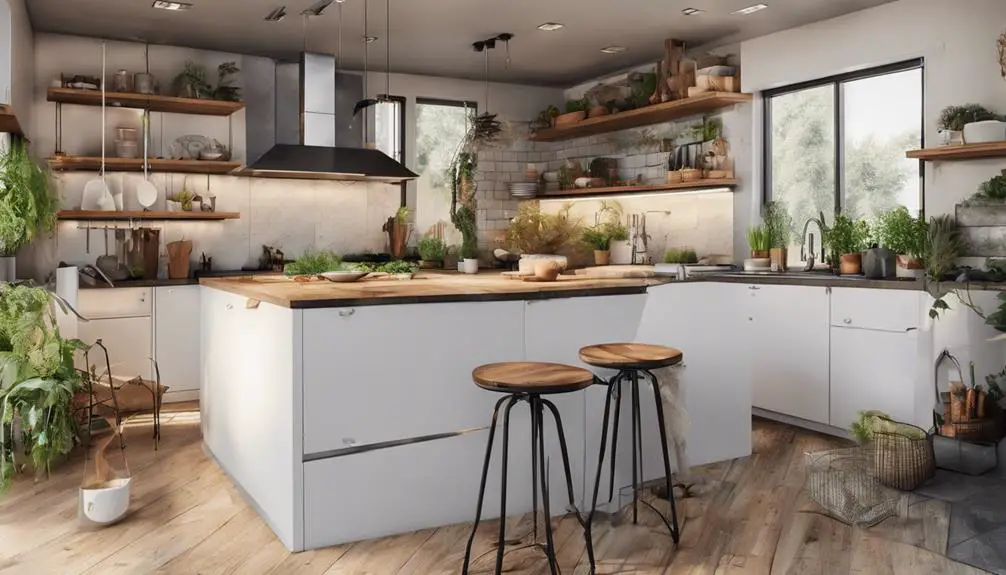
Beyond the strategic placement of your refrigerator, achieving a harmonious kitchen environment also involves a delicate balance of the five elemental energies: wood, fire, earth, metal, and water. The concept of Elemental Harmony doesn't merely refer to the actual materials in your kitchen; it also speaks to the colors you choose and how they interact.
Wood, symbolized by green, can be introduced via plants or green-colored decor. Fire, represented by red, can be incorporated with small appliances or utensils. Earth, denoted by yellow or brown, is commonly present in the form of wooden cabinets or earth-toned tiles. Metal, signified by white or metallic colors, is often already included in your kitchen appliances. Lastly, water, embodied by blue or black, can be included through dark-colored cookware or a blue painting.
Color Coordination is critical, as too much of one element can create imbalance. For instance, an overload of the fire element might create a sense of restlessness, while excess water can lead to feelings of melancholy. Therefore, aim to create a balance that resembles nature, where all elements coexist harmoniously. This won't only enhance the aesthetic appeal of your kitchen but also promote positive energy and well-being.
Frequently Asked Questions
What Are Some Common Mistakes to Avoid When Applying Feng Shui to My Kitchen?"
You're eager to create a harmonious kitchen, but don't rush. Remember, clutter management is key. Avoid letting junk collect on counters. It disrupts the flow of positive energy.
Another common mistake's poor appliance placement. Don't put your stove directly opposite the sink. It creates a fire-water clash.
Take your time, plan well, and you'll create a balanced, serene space.
Can Feng Shui Impact the Health and Well-Being of My Family Through Kitchen Design?"
Absolutely, Feng Shui can impact your family's health and well-being through kitchen design. Consider appliance placement and cooking directions.
When you place appliances harmoniously and face auspicious directions while cooking, you're aligning with positive energy flows. This can enhance your family's health and prosperity.
How Does the Color Scheme in My Kitchen Affect Its Feng Shui?"
Your kitchen's color scheme greatly influences its energy flow. Color psychology plays a vital role here. Bright colors like red or orange stimulate appetite and energy, fostering lively conversations.
Conversely, calming hues like blue or green promote tranquility, helping digestion. Dark colors can feel oppressive, blocking positive energy. So, you're not just picking a color, you're setting the mood and energy of your kitchen.
Make your choice wisely, it's more impactful than you think.
Are There Specific Feng Shui Rules for the Dining Area in the Kitchen?"
Yes, there are specific feng shui rules for your dining area in the kitchen. Dining placement is vital. Ideally, it should be placed away from the main door to avoid disruption.
Lighting also significantly influences the area's chi. Soft, warm lighting enhances the dining experience, promoting good conversation and digestion.
How Can I Incorporate Feng Shui in My Kitchen if I'm Working With a Small Space?"
Even with a small kitchen, you can incorporate Feng Shui. Start with small appliances placement. Keep them tidy and in places that don't block the flow of energy.
Next, adjust your lighting. Proper lighting creates a positive ambiance. Use lights under cabinets for tasks, and soft lights for dining.
Conclusion
In the dance of kitchen Feng Shui, every element holds power. Your kitchen's placement, the stove's positioning, and sink guidelines all influence the energy flow. The refrigerator's spot can even foster prosperity.
Balancing these elements is key. Remember, your kitchen isn't just for cooking; it's the heart of your home. By embracing these Feng Shui principles, you're not just arranging your space, you're harmonizing your life.
So, keep this sacred space clutter-free, welcoming, and vibrant.



Sign up